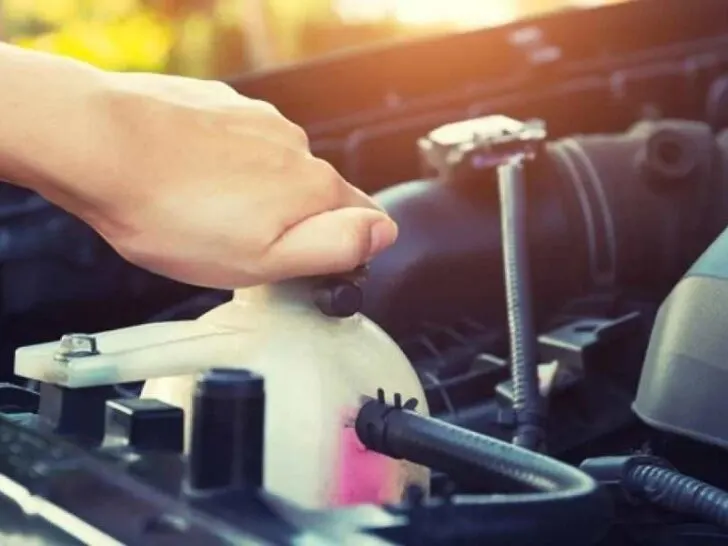Water freezing in the radiator can cause many issues, and it happens mainly in those vehicles that often go in cold areas.
The radiator is a part of the cooling system with water in it. It absorbs the heat from the engine and releases it outside.
What Happens If Water Freezes in Radiator? Water can freeze in the radiator due to cold weather, accumulation of dust, and the presence of rust. In this situation, the engine will not work efficiently, producing excessive heat, squealing sound, and cracking the reservoir. You can unfreeze the water in the radiator by closing the windows and thawing. It is better to turn off the vehicle to prevent any damage to the engine.
You cannot drive your pickup without a radiator because it can cause damage. Furthermore, accidents can occur due to the excessive heat of the engine.
What is a radiator?
The radiator is a part of the vehicle’s engine that reduces the excessive heat from the engine compartment. Furthermore, it is part of the cooling system present in the truck.
In addition, it consists of the thermostat and hoses for the movement of liquid and liquid coolant. Therefore, you can check its temperature with the help of a thermostat.
The thermostat is present in front of the engine and senses heat within no time. Likewise, the radiator receives a signal as a result of high temperature.
Water and coolant from the radiator will go to the engine side and absorb the heat.
Why does water freeze in the radiator?
Here are a few reasons that cause the water to freeze in the radiators. First, it affects the life of the radiator and, ultimately, the vehicle.
Cold weather
One of the significant reasons is the cold weather. When the temperature is low outside the vehicle, the radiator’s temperature also decreases.
Many people go to the hilly areas and enjoy the snowfall during winters. However, they prefer to travel on a pickup for a comfortable journey and take luggage with them.
The snow starts to gather on the surface of the truck in snowfall.
In addition, It also covers the engine compartment from the outside. The snow decreases the temperature and freezes the water inside the radiators.
Many people living in this area face the freezing problem more than others. It is challenging to continue your journey with this issue.
It is better to clear the blanket of snow and allow the vehicle to stay on the side until the water melts in the radiators.
Accumulation of dust
Some people complain about the freezing of water because of the accumulation of dust on the radiators.
The dust forms a layer inside the water passage and blocks the path. As a result, the liquid remains in its position and does not move to the engine side to absorb heat.
The freezing of water starts when it remains in its place for a longer time. Moreover, the heat that stays inside affects the efficiency of the engine.
The dust gathers inside and forms a thick layer. Therefore, it is better to wash and clean the radiators from the workshop after some time.
Presence of rust
The presence of rust in the water reservoir limits the space for the water in the radiator. It happens when you do not take your truck for service timely.
It blocks the holes, limits liquid flow, and ultimately freezes the water. In addition, the rust will damage its body, and liquid leaks from the damaged area.
You can use high-quality aluminum, copper, and plastic radiators to prevent corrosion.
Improper maintenance of the cooling system
There is a cooling system in every truck to maintain the internal temperature. The radiator is the essential part of this system to maintain the temperature.
It contains water as a coolant, but sometimes improper maintenance creates an issue. It limits the system from performing its function, and the excessive heat remains inside.
Whenever the liquid freezes, it expands and occupies more space. If you are in an area where the temperature is low, it affects the cooling system.
It is better to check it before going on a trip to avoid any problems. The cooling system works correctly when there is a regular flow of water.
Why does antifreeze freeze when not mixed with water?
Sometimes there is only water in the reservoir when you take your vehicle for repair and maintenance to the workshop.
It starts freezing when the temperature reaches its freezing point. You can reduce the cold temperature of the liquid if you add antifreeze to it.
It is better to use a mixture of antifreeze agents with water. There are many antifreeze agents available in the market.
Its freezing point is much lower than the water. As a result, it works appropriately and absorbs heat. In this way, the vehicle remains damage-free and prolongs the life of the radiator.
At what temperature will water freeze in a radiator?
The water freezes at 0 degrees Celsius or 32 Fahrenheit as it is the freezing temperature of the water. Furthermore, you use the same water in the radiators, so it starts freezing at the same temperature.
Sometimes you live in an area where the temperature decreases more. It is the best option to mix it with an antifreeze agent. It keeps the liquid from freezing and further damaging the vehicle.
It also depends on the amount and quality of anti freezer used with water. It ranges from -38 Fahrenheit to -35 Fahrenheit or -38 degrees Celsius to -37 degrees Celsius.
What happens when water freezes in the radiator?
It is essential to check the water condition in the radiators before going on a long tour; otherwise, you will face the following consequences.
Improper functioning of the engine
The water freeze in the radiators of the trucks affects the functioning of the engine. Therefore, the proper functioning of the engine depends on the coolant system.
The water in the radiator is an essential part of the engine as it works as a coolant. It does not flow from the reservoir to the engine when it freezes.
When you start the engine, it releases heat into the compartment. The radiators minimize this heat so that engine remains in its normal condition.
Moreover, the freezing of liquid does not absorb the heat.
Instead, the heat accumulates and affects the nearby parts and the engine itself. Therefore, you will face problems while driving, especially in winter.
Production of excessive heat
The purpose of water in the radiator is to absorb heat and release it outside for the proper functioning of the pickup.
Sometimes the liquid freezes and does not move from its position to the engine.
The excessive heat remains there for a longer time. In severe cases, the engine knock occurs when the cylinder bursts due to the higher temperature.
Sometimes the wires and timing belts melt, and there will be vibration during driving. It also affects the cooling system, and fluid leaks when you turn on the vehicle.
Squealing noise
In some cases, you will hear the squealing noise from the cooling system side. It is one consequence of freezing water in the radiator of the pickup.
There will be no proper liquid flow in the engine, and it will become dry. When you put the keys in the ignition, you will hear a noise.
The blockage of the radiator also creates sound. Moreover, the other reason for the clunking sound is the loose belts and improper position of the engine in the truck.
Cracking of reservoir
Liquid occupies more space when it freezes, but the reservoir is not flexible. As a result, the water requires more space in the cold temperature to convert into a solid form.
The reservoir starts cracking when the weather is cold. When you unfreeze it, the liquids start dripping from the crack lines. It produces irritating sounds while driving the vehicle.
It is better to replace the broken reservoir as soon as possible. In addition, many professionals recommend adding the antifreeze agent with water so that it will not freeze.
How to unfreeze water in your radiator?
There are many ways to unfreeze it; you can adopt the following methods melt the water in the truck’s radiator.
Maintain the level of antifreeze
It is necessary to check the water temperature in the truck’s radiator before going on a trip. For this purpose, a thermostat regulates the temperature according to the condition.
It regulates the temperature according to the heat production from the engine. Therefore, it is better to check the antifreeze level and change it with the new one after melting it.
Turn off the vehicle
Many people turn on the vehicle as they think that the engine will produce heat that will ultimately melt the water in the radiator.
Although the heat will not affect the reservoir but remains in the engine compartment and damages the nearby parts.
It is better to turn off the vehicle and park it on the side to avoid this problem.
Thawing process
Thawing is the process of giving heat to the frozen liquid to melt. For example, you can apply this procedure to melt the water in the radiator.
Many people use the hairdryer because they have it in their luggage on a trip. You can also use a fan to give warm air.
When the frozen liquid receives air, it starts to melt. It takes some time, but you will get a positive result.
Close the windows
People park their vehicles and open the window to enjoy the weather. The temperature inside the truck lowers, and ultimately each part becomes cold.
Whenever the water freezes in the vehicle’s radiator, close the windows and allow the temperature to normalize.
Related Articles:

